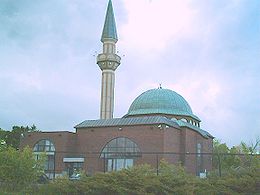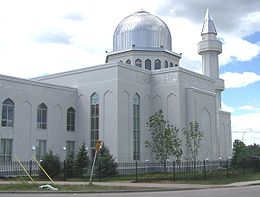- Islam in Canada
-
 A Mosque in Ottawa.
A Mosque in Ottawa.
Part of a series on
Islam by countryThe AmericasAccording to Canada's 2001 census, there were 579,740 Muslims in Canada, just under 2% of the population.[1] In 2006, the Muslim population was estimated to be 0.8 million or about 2.6%. In 2010, the Pew Research Center estimates there were about 0.9 million Muslims in Canada.[1] About 65% were Sunni, while 15% were Shia.[2] Some Muslims are non-practicing.
Contents
Demographics, concentration, and life
Most Canadian Muslims are people who were raised Muslim. There is also a rapidly expanding number of converts to Islam from other religions. As with immigrants in general, Muslim immigrants have come to Canada for a variety of reasons. These include higher education, security, employment, and family re-unification. Others have come for religious and political freedom, and safety and security, leaving behind civil wars, persecution, and other forms of civil and ethnic strife. In the 1980s, Canada became an important place of refuge for those fleeing the Lebanese Civil War. The 1990s saw Somali Muslims arrive in the wake of the Somali Civil War as well as Bosnian Muslims fleeing the breakup of the former Yugoslavia. However Canada has yet to receive any significant numbers of Iraqis fleeing the Iraqi War. But in general almost every Muslim country in the world has sent immigrants to Canada — from Albania to Yemen to Bangladesh.[3]
The fertility rate for Muslims in Canada is significantly higher than the rate for other Canadians (an average of 2.4 children per woman for Muslims, compared with 1.6 children per woman for other populations in Canada).[4]
The majority of Canadian Muslims — and not coincidentally a large proportion of the country's immigrants — live in the province of Ontario, with the largest groups settled in and around the Greater Toronto Area. According to the 2001 Census, there were 254,110 Muslims living in Greater Toronto.[5]
British Columbia also has a significant Muslim population. Canada's national capital Ottawa hosts many Lebanese and Somali Muslims, where the Muslim community numbered approximately 40,000 in 2001.[6] Greater Montreal's Muslim community neared 100,000 in 2001.[6] It is home to large numbers of Canadians of Moroccan, Algerian and Lebanese descent, as well as smaller Pakistani, Syrian, Iranian, Bangladeshi, and Turkish communities.[6] These communities are not exclusively, but predominantly, Muslim. In addition to Vancouver, Ottawa, and Montreal, nearly every major Canadian metropolitan area has a Muslim community, including Halifax (3,070), Windsor (10,745), Winnipeg (4,805), Calgary (28,920), Edmonton (19,580), Vancouver (52,590), where more than a third are of Iranian descent, and Toronto (30,230).[6]
Table 1: Muslim Population of Canada in 2001[7]
Province Muslims %  Ontario
Ontario352,530 3.1%  Quebec
Quebec108,620 1.5%  British Columbia
British Columbia56,220 1.4%  Alberta
Alberta49,040 1.6%  Manitoba
Manitoba5,095 0.4%  Nova Scotia
Nova Scotia3,545 0.3%  Saskatchewan
Saskatchewan2,230 0.2%  New Brunswick
New Brunswick1,275 0.1%  Newfoundland and Labrador
Newfoundland and Labrador630 0.1%  Prince Edward Island
Prince Edward Island195 0.1%  Northwest Territories
Northwest Territories180 0.4%  Yukon
Yukon60 0.2%  Nunavut
Nunavut30 0.1%  Canada
Canada579,640 2.0% As the Canadian Charter of Rights and Freedoms guarantees freedom of religious expression, Canadian Muslims face no official religious discrimination. Under Section 2(a) of the Charter, the wearing of the hijab is permitted in schools and places of work, although Quebec has ruled that the niqab or a burka are not welcome in Schools or Medical facilities with other provinces considering a similar ban.[8] Religious holidays and dietary restrictions are also respected, but outside major urban areas it may be difficult to find halal food. It is also often difficult to observe Islamic rules against usury. Muslims in some parts of Canada have asked to have family dispute courts to oversee small family cases but were faced with rigorous opposition from traditional groups and liberal Muslim groups, labelling the request as a move towards imposing a 'Sharia' Law. This proposal was opposed by the Muslim Canadian Congress, the Canadian Council of Muslim Women and non-Muslim women's groups.[9][10] In light of publicity, Muslims in Canada have elected to put the subject to rest.
History
The Muslim community in Canada is almost as old as the nation itself. Four years after Canada's founding in 1867, the 1871 Canadian Census found 13 Muslims among the population.[11] The first Canadian mosque was constructed in Edmonton in 1938, when there were approximately 700 Muslims in the country.[12] This building is now part of the museum at Fort Edmonton Park. The years after World War II saw a small increase in the Muslim population. However Muslims were still a distinct minority. It was only after the removal of European immigration preferences in the late 1960s that Muslims began to arrive in significant numbers.
According to the Canadian Census of 1971 there were 33,000 Muslims in Canada.[13] In the 1970s large-scale non-European immigration to Canada began. This was reflected in the growth of the Muslim community in Canada. In 1981, the Census listed 98,000 Muslims.[14] The 1991 Census indicated 253,265 Muslims.[15] By 2001, the Islamic community in Canada had grown to more than 579,000.[7] Estimates for the Census 2006 pointed to a figure of 800,000.[2]
Compared to Muslims in Europe, Canadian Muslims have not faced the same set of problems.[16] The Muslim community in Canada is just one among many ethnic, religious, racial and cultural communities that together make up Canada. Although Canadian Muslims may be classified as Muslims for official governmental statistical and policy-making purposes, that does not necessarily mean that all who are identified as such are practicing Muslims. In other words, they may be culturally Muslim, while at the same time leading secular lives, as the case with many Anglophone Christians, especially of Protestant heritage who may be identified as such but have never consider themselves as Christians.
Organisations
The Muslim community in Canada is represented by several organizations:
- The Ahmadiyya Muslim Community Canada.
- the Canadian Islamic Congress
- The Ahlul Bayt Assembly of Canada.
- the Muslim Association of Canada (MAC) which has its foundation rooted in traditional Islamic ideology with a focus on dynamic application within the current Canadian socio-political context.
- the Canadian Council on American-Islamic Relations (CAIR-CAN), a Muslim civil rights organization, which has become one of the leading advocacy voices for the Muslim community,
- the Muslim Canadian Congress, a secular group founded by Tarek Fatah,
- the Canadian Muslim Union another liberal group which split from the MCC,
- as well as other large organisations such as
- Islamic Society of North America (ISNA)
- and the Islamic Circle of North America (ICNA).
However, the major aspect of the Muslim community in Canada is the widespread of cities associations such as the Muslim Council of Montreal for example, Toronto's Council, that deals mainly with issues pertaining to the community in that city and they support the national associations.
Most of these organisations are not grass root organizations, except MAC, but are umbrellas and coordination bodies between local associations.
These are only some of the key organisations within the Muslim Canadian community. As the community is large and diverse with well over 60 ethno-cultural groups various organisations are continually emerging as they seek to meet the needs of community members.
Student-led initiatives are generally well supported and successful, including annual events such as MuslimFest and the Reviving the Islamic Spirit conference, the largest Islamic event in Canada.
Honour
In May, 2010, Canada bestowed honorary Canadian citizenship upon the Aga Khan, a spiritual leader of 20 million Ismaili Muslims worldwide. Aga Khan became the second religious figure after the Dalai Lama to get the country's honorary citizenship.[17][18]
Media
The Canadian Broadcasting Corporation and the National Film Board has developed programing that shares the perspective of live as a Muslim in Canada.
- A documentary by Iranian-born filmmaker Saide Kardar about Toronto's Muslim community and provides a look at the conflict of identity among young Muslims living in Canada.[19]
- Little Mosque on the Prairie is a Canadian sitcom on CBC Television, created by Zarqa Nawaz. The series focuses on the Muslim community in the fictional prairie town of Mercy, Saskatchewan (population 14,000).
- Zarqa Nawaz with the National Film Board has also produced Me and the Mosque (2005) a documentary about the role of women in Islam, both throughout history and in contemporary Canada, told from a personal perspective.[20]
Other:
- The Prime Minister expressed that “Calgarians, Albertans and Canadians will see the moderate, benevolent face of Islam in this mosque and the people who worship here.” and he said, “They will see your love for Canada and your patriotism, and they will see that just as Ahmadis have embraced Canada, Canada has embraced you.”[21]
Further reading
Bakht, Natasha, ed. (2008) Belonging and Banishment: Being Muslim in Canada. Toronto: TSAR. ISBN 978-1-89477-48-4.
See also
- Religion in Canada
- Canadian Council on American-Islamic Relations
- Category containing Canadian Muslims
- Canadian Islamic Congress
- Council on American-Islamic Relations
- Islamic Society of North America
- List of Canadian Muslims
References
- ^ Population by religion, by province and territory (2001 Census)
- ^ a b http://www.environicsinstitute.org/PDF-MuslimsandMulticulturalisminCanada-LiftingtheVeil.pdf -- Muslims and Multiculturalism in Canada. March 2007. Retrieved 26 March 2011.
- ^ 2001 Census of Canada: http://www12.statcan.ca/english/census01/home/index.cfm
- ^ Region: Americas
- ^ Canada Census 2001
- ^ a b c d 2001 Census of Canada
- ^ a b Canada Census 2001
- ^ http://www.cbc.ca/canada/montreal/story/2010/03/16/reasonable-accommodation-ramq-health-board.html
- ^ Boase, Sharon, "Women's groups fight sharia in Ontario; Two reports submitted by a Muslim women's organization say introducing Islamic law into the province will harm the rights of vulnerable women", Hamilton Spectator, September 16, 2004
- ^ Ogilvie, Megan, "Canadian Muslims give mixed reviews on moratorium; Debate urged on Islamic penal code Proposal would halt death penalty Proposal would halt stoning, death penalty Debate urged on Islamic penal code", Toronto Star, April 1, 2005.
- ^ 1871 Census of Canada
- ^ Saudi Aramco World: Canada's Pioneer Mosque: http://www.saudiaramcoworld.com/issue/199804/canada.s.pioneer.mosque.htm
- ^ 1971 Census of Canada
- ^ 1981 Census of Canada
- ^ 1991 Census of Canada
- ^ Canada's Muslims: An International Comparison: http://www.cbc.ca/news/background/islam/muslim-survey.html
- ^ http://www.torontosun.com/news/torontoandgta/2010/05/28/14178161.html
- ^ http://www.thestar.com/news/gta/article/815518--spiritual-head-of-ismaili-muslims-returns-to-toronto
- ^ Homegrown Muslims
- ^ NFB - Collection - Me and the Mosque
- ^ Prime Minister Stephen Harper attends the opening of Canada's Largest Mosque
External links
- Ahlul Bayt Assembly of Canada
- Canada religious census 2001
- Islamic Association in Canada
- Canadian Council Of Muslim Women
- Ahmadiyya Muslim Community Canada
Antigua and Barbuda · Argentina · Bahamas · Barbados · Belize · Bolivia · Brazil · Canada · Chile · Colombia · Costa Rica · Cuba · Dominica · Dominican Republic · Ecuador · El Salvador · Grenada · Guatemala · Guyana · Haiti · Honduras · Jamaica · Mexico · Nicaragua · Panama · Paraguay · Peru · Saint Kitts and Nevis · Saint Lucia · Saint Vincent and the Grenadines · Suriname · Trinidad and Tobago · United States · Uruguay · Venezuela
Dependencies and
other territoriesAnguilla · Aruba · Bermuda · Bonaire · British Virgin Islands · Cayman Islands · Curaçao · French Guiana · Greenland · Guadeloupe · Martinique · Montserrat · Navassa Island · Puerto Rico · Saint Barthélemy · Saint Martin · Saint Pierre and Miquelon · Saba · Sint Eustatius · Sint Maarten · South Georgia and the South Sandwich Islands · Turks and Caicos Islands · US Virgin Islands
Categories:
Wikimedia Foundation. 2010.

